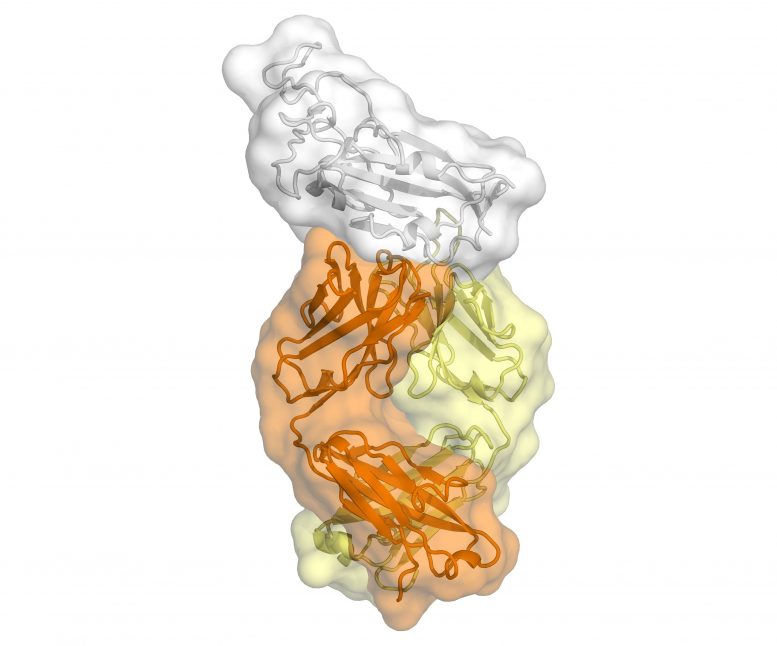COVID-19 Breakthrough: SARS-CoV-2 Coronavirus Vulnerability Discovered From An Antibody Against SARS
Source: COVID-19 Breakthrough Apr 20, 2020 5 years, 5 months, 3 weeks, 6 days, 4 hours, 32 minutes ago
COVID-19 Breakthrough: According to a study by genomic and medical researchers at Scripps Research, an antibody recovered from a survivor of the SARS epidemic in 2003s has revealed a potential vulnerability of the SARS-CoV-2 coronavirus.
 The antibody called CR3022, produced by a patient in response to the coronavirus that causes SARS, also binds to the new coronavirus that causes COVID-19. Credit: Meng Yuan and Nicholas Wu
The antibody called CR3022, produced by a patient in response to the coronavirus that causes SARS, also binds to the new coronavirus that causes COVID-19. Credit: Meng Yuan and Nicholas Wu
The detailed research study is the first to map a human antibody’s interaction with the new coronavirus at near-atomic-scale resolution. Although the antibody was produced in response to an infection of SARS (severe acute respiratory syndrome), which is caused by the SARS-CoV virus, it cross-reacts with the new coronavirus, SARS-CoV-2.
https://science.sciencemag.org/content/early/2020/04/02/science.abb7269
It was observed that the structural mapping revealed a nearly identical site on both coronaviruses to which the antibody binds, suggesting a functionally important and vulnerable site for this family of coronaviruses.
The study’s senior author Dr Ian Wilson, DPhil, Hansen Professor of Structural Biology and Chair of the Department of Integrative Structural and Computational Biology at Scripps Research told Thailand Medical News, “The knowledge of conserved sites like this can aid in structure-based design of vaccines and therapeutics against SARS-CoV-2, and these would also protect against other coronaviruses–including those that may emerge in the future.”
The SARS-CoV coronavirus, which causes SARS, originated in horseshoe bats, but jumped to humans in South China in 2002, eventually infecting more than 8,000 people and killing almost 800 before it was quelled by lockdowns, quarantines and other measures.
However the more infectious SARS-CoV-2, a closely related coronavirus that causes COVID-19, first emerged in the Chinese city of Wuhan in late 2019 and to date killed more than 167,000 individuals and infected millions with many not tested yet.
The development of a vaccine or even an effective treatment could significantly ameliorate the crisis.
To date, the Wilson lab is known for its pioneering structural studies of antibodies bound to viruses including HIV and influenza. These studies have been used to inform designs of vaccines and antibody drugs, as well as other therapeutics.
Along with hundreds of other labs around the world, Wilson’s team is now focused on SARS-CoV-2.
The study’s co-first author Dr Nicholas Wu, PhD, a postdoctoral research associate in the Wilson lab commented, “Our ultimate goal here is to obtain structural information on antibodies and their binding sites, and use that to guide SARS-CoV-2 vaccine design, just as our lab has done with influenza and HIV.”
We desperately need your kind help! Please help support our site and our initiatives to propel and aid research by making a donation to help sustain the site. We are also trying to raise funds to help poor undocumented refugees who have no access to pub
lic healthcare during the COVID-19 crisis. Donations are accepted via paypal: https://www.thailandmedical.news/p/sponsorship
The recent research study centers on an anti-SARS-CoV antibody called CR3022 that was originally isolated in 2006 by the pharmaceutical company Crucell Holland B.V. in the Netherlands.
A study report from Chinese researchers earlier this year indicated that CR3022 cross-reacts against SARS-CoV-2. Wilson’s team used their structural mapping expertise to determine how the antibody binds to SARS-CoV-2.
A significant finding is that the antibody’s binding site is highly similar between the two coronaviruses–differing by just four protein building blocks called amino-acids. That high degree of similarity implies that the site has an important function that would be lost if it mutated significantly.
However, the site’s function remains mysterious. The Scripps Research analysis found that the antibody binding site is relatively remote from the part of the virus that grabs hold of cell-surface protein receptors in preparation for penetrating cells in our lungs. That suggests that, at least for SARS-CoV, CR3002 neutralizes the virus’s ability to infect cells in some indirect way.
Even more interesting is the finding that the antibody binding site on these viruses is not normally accessible to antibodies.
Dr Meng Yuan, Ph.D., also a research associate in the Wilson lab and co-first author said, “We found that this region is usually hidden inside the virus, and only exposed when that part of the virus changes its structure, as it would in natural infection.”
Even with the slightness of difference between the two coronaviruses, the antibody binds much less tightly to SARS-CoV-2 than it does to the SARS virus, and cannot neutralize SARS-CoV-2 in lab dish tests as it does SARS-CoV.
However the findings suggest that the binding site for this antibody on SARS-CoV-2 is a site of vulnerability, and that antibodies binding it more tightly would plausibly succeed in neutralizing the virus. Such neutralizing antibodies, if developed into therapies, could be used to treat COVID-19 patients and to provide temporary protection from the virus to uninfected individuals, for example healthcare workers.
Furthermore the fact that this binding site is highly conserved between SARS-CoV and SARS-CoV-2 also hints that there may be antibodies, still to be discovered, that can effectively neutralize both viruses–and perhaps in the same way, can neutralize future emergent coronaviruses before they can cause pandemics.
Research Labs at Scripps Research and throughout the world are currently seeking antibodies, via blood donations, from people who have recovered from COVID-19 for further studies along these lines.
For the latest
COVID-19 Breakthroughs, keep logging on to
Thailand Medical News.
We desperately need your kind help! Please help support our site and our initiatives to propel and aid research by making a donation to help sustain the site. We are also trying to raise funds to help poor undocumented refugees who have no access to public healthcare during the COVID-19 crisis. Donations are accepted via paypal: https://www.thailandmedical.news/p/sponsorship
